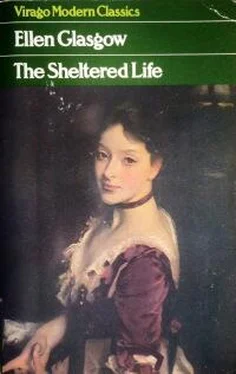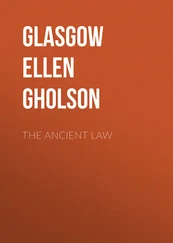Ellen Glasgow - The Sheltered Life
Здесь есть возможность читать онлайн «Ellen Glasgow - The Sheltered Life» весь текст электронной книги совершенно бесплатно (целиком полную версию без сокращений). В некоторых случаях можно слушать аудио, скачать через торрент в формате fb2 и присутствует краткое содержание. Жанр: Классическая проза, на английском языке. Описание произведения, (предисловие) а так же отзывы посетителей доступны на портале библиотеки ЛибКат.
- Название:The Sheltered Life
- Автор:
- Жанр:
- Год:неизвестен
- ISBN:нет данных
- Рейтинг книги:5 / 5. Голосов: 1
-
Избранное:Добавить в избранное
- Отзывы:
-
Ваша оценка:
- 100
- 1
- 2
- 3
- 4
- 5
The Sheltered Life: краткое содержание, описание и аннотация
Предлагаем к чтению аннотацию, описание, краткое содержание или предисловие (зависит от того, что написал сам автор книги «The Sheltered Life»). Если вы не нашли необходимую информацию о книге — напишите в комментариях, мы постараемся отыскать её.
The Sheltered Life — читать онлайн бесплатно полную книгу (весь текст) целиком
Ниже представлен текст книги, разбитый по страницам. Система сохранения места последней прочитанной страницы, позволяет с удобством читать онлайн бесплатно книгу «The Sheltered Life», без необходимости каждый раз заново искать на чём Вы остановились. Поставьте закладку, и сможете в любой момент перейти на страницу, на которой закончили чтение.
Интервал:
Закладка:
But the Birdsongs' house was so lonely she could scarcely bear to stay a moment inside. Life, air, colour, animation, all had melted away since yesterday morning. Was it being lived in that made houses alive? she asked herself, gazing at the silent canary. Or did Mrs. Birdsong possess some peculiar enchantment, some living magic of personality? Never, never had she felt such loneliness, such stillness, such vacancy. "When he comes back, and I know he is in town, everything will be different," she thought. "Then I shan't mind coming over here every morning. Even if we never meet, it will be something to feel that he will soon be in the house." The garden, too, was as flat and glittering as if it were seen under glass. Looking out, as she went through the library, she saw the overgrown flowerbeds, the web of blue morning glories, and a bent old coloured man cutting the tall grass with a sickle. Nothing looked natural. Every tree, every shrub, every flower, and even the monotonous rhythm of the sickle and the pale swaths of grass all seemed to be swimming in loneliness. "I've only three days to wait," she thought. "Not quite three days, because a part of one is already over." But, after three days, what did she expect? For what was she waiting? She could not answer. She did not know. Suddenly, she thought with a rush of emotion, a welling up of delight, "Just to see him again! After all this loneliness, just to see him again!"
As she turned back into the library, the door of the cupboard swung open, and she caught a glimpse of the brown woolen sweater he had worn for golf on cool days. Going inside, she buried her face in the knitted thickness and roughness and the intoxicating smell of sunshine on red clover. Little pointed flames flickered over her cheeks. Almost she could bring him back to her. Almost she could feel his arms about her and his eager kiss on her mouth. If only she had known sooner! Now, as long as he was away, she could steal over every morning, when nobody suspected, and bury her face in the brown wool while she pretended that she was clasped in his arms. Then, as she heard the sound of Maggie's step in the hall, she slipped out of the cupboard, shut the door carefully, and ran out of the house.
For three days, and then three other days, she kept this joy secret. Not to her mother, not to her grandfather, could she let the slightest sign of it escape. For they, of course, could never understand how she felt. They would think that she hoped to be happy, when all she wanted was to love in vain and for ever, to feel this longing hidden safe away in her heart. For her feeling had altered once more. After six days of waiting for nothing, of passionate silence, all the bitterness was drained out of her thoughts. He might tease her now; he might mock her as much as he pleased, if only he would come back.
But he did not come back for another week, and when he came, she did not see him alone. Though the General brought news of him or of Mrs. Birdsong every day, George came to the house only for a few minutes before or after his game of golf. He was always either just going out to the club, or just going home to change before dinner. Then, at last, he dropped in quite casually one Sunday evening and asked Mrs. Archbald if he might stay to supper. Jenny Blair was wearing her prettiest summer dress. At the first sound of his voice in the hall, she had flown upstairs to her room; she had seized her rose-coloured chiffon from the closet; she had shaken the flounces until they were smooth; she had slipped them over her head; she had wrapped the sash of blue ribbon round her waist and knotted it in a flowing bow at her left side. In five minutes, scarcely more, she was down again in the drawing-room, with her hair as lustrous as satin and her face glowing like a carnation. Her heart was beating all over her body. Not only in her bosom and in her ears, but everywhere. The drumming was so loud that it frightened her. Suppose her mother, who missed so little, should ask her what was the matter. Then, she felt, she should die. She could not live if she were dragged out into the light and her agitation exposed.
But nobody noticed. Nobody heard her heart, though it sounded, she thought, as relentless as the breaking of waves on a beach. Though she shivered in the heat when George, who was fresh and bronzed and ruddy, said carelessly, "Why, Jenny Blair, you look like a doll," she was able to toss back flippantly, "Not in this old thing. I've had it for ages."
"But it is one of your new dresses," her mother corrected.
"Well, it feels old. I put it on because it is cool."
"It's a nice colour," her grandfather observed, peering over his glasses with a puzzled expression. "Those thin, frilly dresses are very becoming."
At last they went in to supper, and afterwards (how had she been able to live through it?) George had talked to her grandfather for the rest of the evening. Even on the back porch in the moonlight (which was so living and savage that it stole into her mind, and made her more unhappy than she had ever been in her life) he still talked to her mother and her grandfather. They spoke of politics (all were Democrats but they disapproved of both parties and agreed that there was nothing to be done about them); they spoke of foreign affairs, of Austria and Servia, of the Liberals in England, who were not so very liberal, after all, and of the Irish question, which was becoming more and more Irish; they spoke of the suffragettes in other places and the suffragists in Queenborough (though George was inclined to make fun of them, Grandfather felt that the easiest way to avoid trouble was to give women what they wanted whenever they wanted it); they spoke of the heat wave, which they called the worst of the summer, and George insisted it was better to pay no attention to it, while Grandfather and Mamma believed that one should stop eating meat and move about as little as possible. Then, at last, after hours of misery, they began, just as George was leaving, to speak of that evil odour, and to wonder if it would end by driving them out of the neighbourhood, which, Mamma declared, was rapidly becoming impossible.
"You don't notice it to-night," George said. "There's not a whiff of it out here. The scent of mimosa is delicious."
"It doesn't bother us often," Mrs. Archbald admitted. "Weeks go by, and nobody but Etta complains of it. Then something happens, either the wind turns or they are careless down at the plant, and the smell is quite disagreeable."
"I've never been positive," the General insisted, "that it isn't mere imagination, or the emptying of garbage cans somewhere in the alley. I've tried my best, and I'm never able to detect it. Not more than once or twice, anyway, and then only for a minute or so."
"That was when it was very strong, Father."
"Maybe you're right, my dear, and my senses are less keen than they used to be."
"Oh, I didn't mean that, dear Father," Mrs. Archbald put her hand on his arm with an affectionate pressure, "I didn't mean that."
"Well, it would be funny if it drove us all out of the neighbourhood." George could no more help smoothing things over, Jenny Blair knew, than he could help the sanguine tone of his voice. That was his charming way, and she asked herself vehemently if any man in the world could compare with him. "It would be funny," he repeated, standing there in the moonlight, with the open door at his back, "if, after having lived most of our lives here, we should be driven away at last by a smell."
"I shall hold my ground a little longer," the General declared, "in the hope that Cora's idealism, which John insists I share also, may pretend the nuisance away."
"It's amazing, isn't it, how the town, or our part of it, has run off and left us? A few more years, and industrialism will have swallowed us whole. Nothing can stop it, except another war, and that isn't likely. Not for us at least. It wouldn't surprise me any day if Ulster were to begin fighting in earnest, and trouble may come, though I doubt that, of this affair on the Continent. But we aren't apt to go far enough out of our way to start fighting in Europe."
Читать дальшеИнтервал:
Закладка:
Похожие книги на «The Sheltered Life»
Представляем Вашему вниманию похожие книги на «The Sheltered Life» списком для выбора. Мы отобрали схожую по названию и смыслу литературу в надежде предоставить читателям больше вариантов отыскать новые, интересные, ещё непрочитанные произведения.
Обсуждение, отзывы о книге «The Sheltered Life» и просто собственные мнения читателей. Оставьте ваши комментарии, напишите, что Вы думаете о произведении, его смысле или главных героях. Укажите что конкретно понравилось, а что нет, и почему Вы так считаете.












